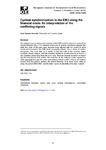Cyclical synchronization in the EMU along the financial crisis: An interpretation of the conflicting signals

Ver/Abrir
Use este enlace para citar
http://hdl.handle.net/2183/23339Colecciones
Metadatos
Mostrar el registro completo del ítemTítulo
Cyclical synchronization in the EMU along the financial crisis: An interpretation of the conflicting signalsAutor(es)
Fecha
2012Cita bibliográfica
Cancelo, J. R. (2012). Cyclical synchronization in the EMU along the financial crisis: An interpretation of the conflicting signals. European Journal of Government and Economics, 1(1), 86-100. https://doi.org/10.17979/ejge.2012.1.1.4278
Resumen
[Abstract] We analyze how cyclical synchronization in the EMU evolved since the onset of the current financial crisis. The standard measures of cyclical correlation suggest that while the cycle of the euro area became more aligned with the cycles of other developed economies, the EMU itself apparently entered into a phase of cyclical divergence. We show that as a matter of fact the bulk of the member states remained closely aligned, and the seeming decline in synchronization is due to a few countries decoupling from the euro area. Next we present empirical evidence that the foundations that explain the evolution of the national cycles against the EMU aggregate through the crisis were already latent in 2007. Greece and Ireland deviate from the general pattern, the former because of its loose fiscal policy all along the period 2000-2007, and the latter due to the flexibility of its labor market
Palabras clave
International business cycles
Euro area
Cyclical convergence
Asymmetric responses
Euro area
Cyclical convergence
Asymmetric responses
Versión del editor
Derechos
Atribución 4.0 España
ISSN
2254-7088






